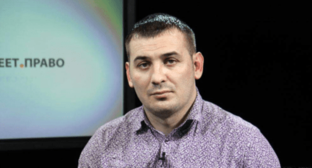04 April 2003, 20:27
al-Kuduki
Hajji Muhammad ibn Musa ibn Ahmad al-Kuduki ar-Rugudji al-Avari ad-Dagistani (1652-1717), a multitalented Dagestani scientist, author of popular compositions on Arabic grammar, logic, dogmatics, numerous notes on Muslim law issues, founder of and instructor at a madrasah. The nisba of al-Kuduki is due to the name of the village Kudutl (now Gergebilsky County, Dagestan; the Arabic form in the local chronicles and historic notes is Kuduk). In Arabic memorial notes, the years of birth and death of al-Kuduki vary.
Al-Kuduki received primary education in his homeland, in his father's (Musa of Kudutl) madrasah and later studied in a village of Rugudja (now Gunibsky County) with Abubakar, his to-be father-in-law. After that, he pursued solid studies with two famous Dagestani scientists, founders of and instructors at a madrasah - Alirza (died in 1676) of the village of Sogratl (now Gunibsky County; the Arabic form is Sugur, hence the nisba of as-Suguri) and Shaban (died in 1667) of the village of Oboda (hence the nisba of al-Ubudi) of Khunzakhsky County. Al-Kuduki's curriculum included the Koran, tafsir, khadises, Arabic grammar, Muslim law, and logic. To perfect his knowledge, he visited Egypt, Hidjaz, and Yemen, and, under unconfirmed information, "other Muslim countries": the Crimea, the Caucasus, Azerbaijan, Iran, Khorasan, Central Asia, and Turkey. In the Middle-East countries, he enriched his knowledge in the issues of dogmatics, law, mathematics, and philosophy. In Yemen, he met Salikh al-Yamani, with who he stayed and studied for seven years. According to memorial notes, the Turkish Sultan Sheikh al-Islam settled al-Kuduki in Egypt where he lived for many years. After Salikh al-Yamani died in September 1697, al-Kuduki returned to Dagestan fetching his book collection and his teacher's manuscripts. In Dagestan, he at first instructed in the villages of Koroda and Kudutl. He stayed in the latter one to settle and start teaching activities and manuscript copying. He soon married his ex-teacher Abubakar's daughter who bore him three sons - Dibir, Abubakar, and Muhammad (hajji Muhammad). Later, they also became scientists (alim).
Al-Kuduki's madrasah enjoyed much popularity; there were natives of Dagestan, Northern Caucasus, and the Volga Region among its students (mutalim, Arabic muta'allim). Many of his students, the graduates of Kudutl madrasah, later became eminent scientists and educators: Damadan of Megeb, hajji Daud of Usish, Muhammad of Ubr, Alikuli of Rugelda, Muhammad of Karaty, Tayyib of Kharakhi, Mallamuhammad (mullah Muhammad) of Batsady, hajji Daud of Nukush, Muhammad, hajji Umar's son, Muhammad the Wolf Killer of Kudutl, Bagtchilav of Machada, and others.
In late 1716 or early 1717, al-Kuduki, accompanied by two sons, left Dagestan and headed for Syria. Some believed this was a usual departure for a hajj; the others considered it al-Kuduki's protest against cultivating the common law norms and ignoring the shariat directives by his contemporaries and a desire to live in a country with solid positions of Islam. In Syria, al-Kuduki fell ill and soon deceased in the city of Haleb (Aleppo), in "Sheikh Ikhlas's cell." As the memorial note says, he was buried in the Djilat (or, according to other data, Djubayl) Cemetery within the city walls. His sons Muhammad and Abubakar died of cholera in the same year.
In dogmatic issues, al-Kuduki adhered to the system of the Islamic scholastics founder al-Ashari (873-935), and in canonic law - to Muhammad ash-Shafii's (767-820) school, but did not consider himself tied to them; instead, following Salikh al-Yamani's example, he "employed the idjtikhad."
Al-Kuduki's compositions: Al-Khashiya ala-l-Tcharpardi, a textbook, popular in Dagestani madrasahs in 18th century, an interpretation of the commentary of Ahmad al-Tcharpardi (died in 1345) for Ibn al-Khadjib's (died in 1248) composition on Arabic grammar, entitled ash-Shafiya (the Healing One). In the Manuscript Collection of the IIAE DNC of the Russian Academy of Sciences, there are 12 handwritten copies (some intravital among of them) of this composition, made in Dagestan between 1709 and 1760. Al-Kuduki also authored two more compositions on Arabic grammar, the more popular one of them being Isam ala-l-Djami - a sub-commentary on the sharkh od Isam ad-din al-Isfaraini (died in 1537) for the didactic tractate of Abd ar-Rakhman Djami (died in 1492) entitled al-Favaid ad-Diya'iya. This work was known well beyond Dagestan: it was published in Turkey in 1892 under the title of Kuduki. One of the printed copies of this work, which was widely distributed in Dagestan, has a later note that the published text had been verified with al-Kuduki's manuscript, which is unfortunately not extant. His other composition, Tarkib Miat amil, is a commentary on the work Miat amil by al-Djurdjani (died in 1078) on Arabic morphology.
Al-Kuduki's scientific interests went far beyond grammar surveys. He authored valuable works in other branches of knowledge of his time: a tractate on metaphors Isti'ara 'ala-d-Dibadj, a commentary on logic compositions (no title), and a calendar adapted to the geographic coordinates of Dagestan Khisab al-Kuduki, Allah's name interpretations Sharkh asma' Allah al-husna. All the aforementioned works are written in Arabic, but there are also a number of poetry texts written in his native Avar language.
Al-Kuduki was considered an eminent law scientist, even though no more or less significant fikkh composition has been discovered as of now. However, the Manuscript Collection of IIAE and multiple private collections maintain a large number of separate quotations by al-Kuduki, notes, footnotes, glosses, replies to letters on different issues of Muslim law - jurisprudence and law practice (on vakf, on issues of land, family, and inheritance law, on interaction of shariat and adat legal norms, on distribution of zakat among the students, etc.). In Dagestani authors' compositions, as well as on the margin of manuscripts copied in Dagestan, one can encounter numerous judgments by al-Kuduki exactly on the legal issues. These materials are not collected, not systematized, and not researched.
According to some sources, al-Kuduki personally copied over 300 books, and most part of them was left, according to a legend, in Khaleb (Aleppo). Obviously, the manuscripts copied both by him personally and by his numerous madrasah students are meant in this case. In different collections in Dagestan, there have been discovered manuscripts copied by al-Kuduki. These are: Muhammad al-Ardabili's Shrkh al-Unmuzadj on Arabic grammar, Ibn Khadjar's al-Minah al-Makkiya commentary on al-Busiri's poem Umm al-kura, Yusuf al-Ardabili's Sharkh al-Idjaz commentary on Muslim law, Masud at-Taftazani's composition al-Mutavval fi-l-ma'ani, a commentary on Muhammad al-Kazvini's Talkhis al-miftah, a public speaking textbook, and two volumes of Muhammad al-Ardabili's al-Anvar on Muslim law.




